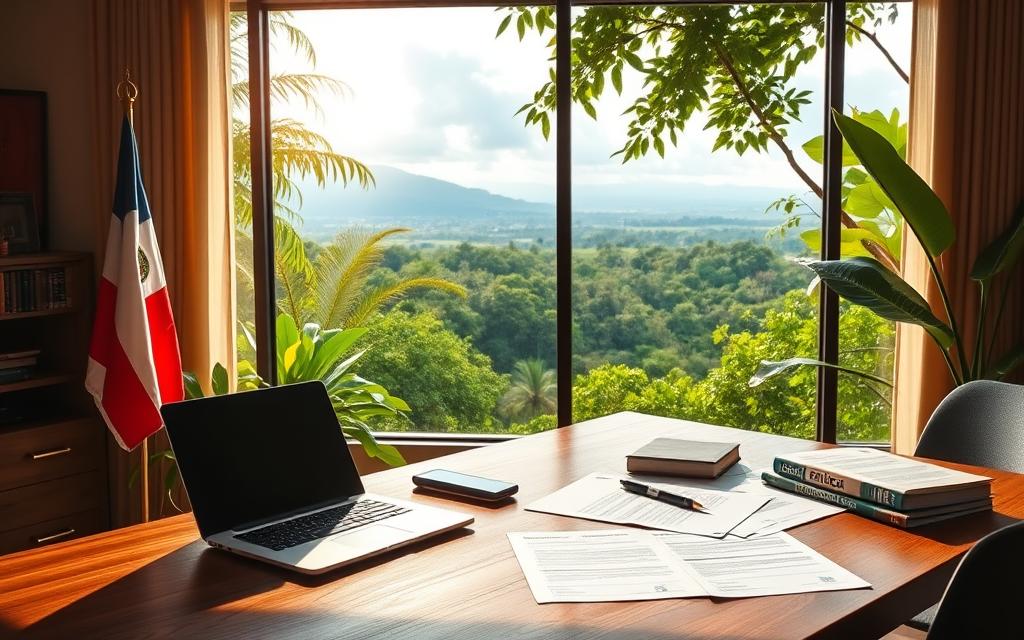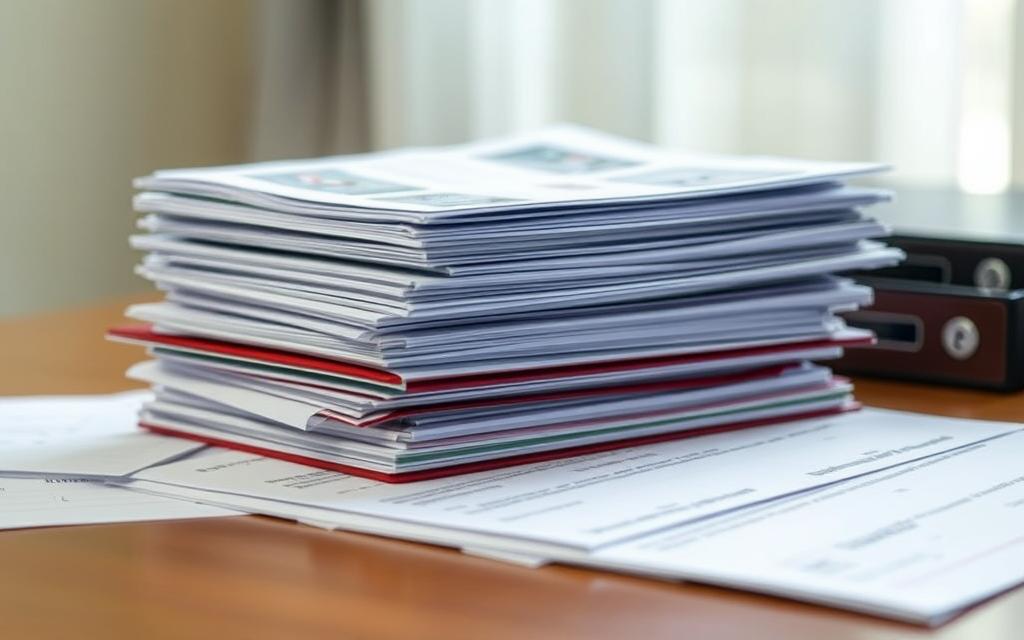Documents Needed for Costa Rica Residency: A Complete Guide

Did you know that over 70,000 U.S. citizens have chosen to make Costa Rica their home? This Central American gem is not just a vacation spot but a place where many decide to settle permanently. Its stunning landscapes, stable democracy, and warm culture make it an attractive destination for individuals and families alike.
Living in this country offers a unique blend of natural beauty and modern convenience. From lush rainforests to pristine beaches, Costa Rica is a paradise for those seeking a better quality of life. The residency process here is designed to cater to diverse needs, with options like rentista, investor, and permanent permits.
Understanding the required documents is crucial for a smooth transition. Whether it’s a birth certificate or financial proof, having the right paperwork ensures no delays. This guide will walk you through the essentials, helping you navigate the process with ease.
Overview of Residency in Costa Rica

Known for its pura vida lifestyle, Costa Rica offers a unique blend of culture and natural beauty. The country’s warm and friendly locals make it a welcoming destination for expatriates. Whether you’re drawn to its lush rainforests or pristine beaches, the lifestyle here is both relaxing and enriching.
To stay longer than 90 days, a proper residence permit is required. This system reflects the country’s flexible yet rigorous immigration policy. Understanding the requirements, such as a valid passport and birth certificate, is essential for a smooth application process.
Welcoming Lifestyle and Rich Culture
Costa Rica’s vibrant culture is rooted in its traditions and community spirit. The pura vida philosophy emphasizes happiness and simplicity, creating a positive environment for residents. This welcoming atmosphere makes it easier for newcomers to adapt and thrive.
Diverse Residency Options to Enhance Quality of Life
The country offers a range of residency options to suit different needs. From retirees to investors, there’s a program for everyone. Each option requires specific documents, such as proof of income or a bank certificate, to ensure eligibility.
By understanding these requirements, applicants can navigate the process with confidence. For more insights, explore Costa Rica residency options and their benefits.
Documents needed for Costa Rica residency

Navigating the requirements for settling in Costa Rica starts with understanding the essential paperwork. Proper preparation ensures a smooth application process and avoids unnecessary delays. Below, we break down the key materials you’ll need to gather.
Essential Identification and Legal Documents
To begin, you’ll need a valid passport with at least six months of validity. A birth certificate is also required, and it must be current and properly legalized. Police clearance records from your home country are mandatory to prove a clean criminal history.
For married applicants, a marriage license is necessary. Financial proof, such as a letter detailing your income, is crucial for certain residency categories. These documents must be accurate and up-to-date to meet local standards.
Translation, Notarization, and Consular Legalization
All documents not in Spanish must be translated by a certified professional. Notarization ensures the authenticity of your paperwork, while consular legalization validates it for use in Costa Rica. This step is vital to comply with local legal requirements.
Keep in mind that every document must be current and properly prepared. Strict adherence to these processes helps expedite your application and ensures a hassle-free experience.
Understanding Residency Categories and Their Requirements
Costa Rica offers diverse residency options tailored to different lifestyles and goals. Whether you’re looking to retire, invest, or establish a permanent home, there’s a program designed to meet your needs. Each category has specific conditions that applicants must fulfill to qualify.
Rentista, Investor, and Permanent Residency Explained
The rentista category is ideal for individuals with a steady income from outside the country. Applicants must demonstrate a minimum monthly income of $2,500 for at least two years. This proof of financial stability ensures you can support yourself without relying on local employment.
For those looking to contribute to the economy, the investor category requires a significant financial commitment. A minimum investment of $150,000 in real estate or approved projects is necessary. This option not only grants residency but also opens doors to potential business opportunities.
Permanent residency is available to those who have lived in the country for at least three years under a temporary permit. This status offers long-term stability and access to benefits like the national healthcare system. Proper record submission and fee payment are critical to securing this status.
All documents must be translated into Spanish and notarized to comply with immigration standards. Whether you’re providing proof of income or investment details, accuracy is essential. Understanding these requirements helps applicants choose the right path and avoid delays.
Step-by-Step Guide to the Application Process
Starting your journey to settle in Costa Rica begins with understanding the application process. It’s essential to follow each step carefully to avoid delays and ensure a smooth transition. Here’s a clear roadmap to help you navigate the process with confidence.
Obtaining a Provisional Visa at the Consulate
The first step is to apply for a provisional visa at a Costa Rican consulate in your home country. This visa allows you to enter the country and begin the residency process. You’ll need to submit your passport, birth certificate, and other required materials.
All paperwork must meet the local authority’s standards. This includes having documents translated by a certified translator if they’re not in Spanish. Consular legalization ensures your paperwork is valid for use in Costa Rica.
Submitting Your Application at the Immigration Department
Once you arrive in the country, the next step is to visit the Immigration Department. Here, you’ll submit your completed application form and pay the necessary fees. Fingerprint registration is also part of this process.
Ensure all forms are accurate and up-to-date. Timely payment of fees is crucial to avoid delays. For detailed guidance, explore the legal requirements for residency in Costa.
By following these steps, you can streamline your application and reduce the risk of setbacks. Proper preparation and attention to detail are key to a successful process.
Key Tips for Preparing Your Documents

Preparing your paperwork for residency requires attention to detail and a clear understanding of the process. Ensuring all materials are accurate and up-to-date is essential for a smooth application. Below, we share practical tips to help you navigate this crucial step.
Meeting Income and Financial Proof Requirements
Proof of income is a critical component of your application. Whether you’re applying as a retiree or an investor, you’ll need to provide bank statements or investment certificates. For business owners, demonstrating a steady income stream is equally important.
Ensure your financial documents are current and meet the minimum income thresholds. This step helps establish your ability to support yourself without relying on local employment.
Ensuring Accuracy with Notarizations and Translations
All paperwork must be notarized and translated into Spanish if it’s in another language. Certified translators ensure your documents are accurately interpreted, while notarization confirms their authenticity.
Double-check each document to avoid errors. Even minor mistakes can lead to delays or rejections. Proper preparation ensures your application moves forward without unnecessary setbacks.
Staying Updated with Legal and Consular Procedures
Immigration laws and consular requirements can change. Regularly check for updates to ensure your paperwork complies with the latest standards. This proactive approach helps you stay ahead of any new regulations.
Consulting legal experts can also provide valuable insights. They can review your documents and guide you through the process, ensuring everything is in order before submission.
Additional Documents and Specific Case Considerations
When applying as a family unit, additional paperwork is often required to verify relationships and eligibility. This ensures that all members meet the legal standards for the process. Proper preparation is key to avoiding delays or complications.
Proof of Family Relationships and Dependent Documentation
For family-based applications, proof of marriage and birth records are essential. These documents verify the relationships between the primary applicant and dependents. Accurate details, such as the date and place of events, must be included to meet legal requirements.
Country origin information is also necessary for all supporting members. This helps authorities confirm the validity of the paperwork. Every individual listed in the application must provide their relevant records.
Filings concerning additional family members must adhere to the same stringent verification process. This includes notarization and translation into Spanish if the original documents are in another language. Consulting legal advisors can help ensure all extra materials are submitted correctly.
By carefully preparing these documents, families can streamline their application process. Attention to detail and compliance with local standards are crucial for a successful outcome.
Common Pitfalls and How to Avoid Them
Many applicants face challenges due to simple oversights in their paperwork. These mistakes can lead to delays or even denials, making it crucial to stay vigilant throughout the process. By understanding these common issues, you can take proactive steps to ensure a smooth experience.
Incomplete Documentation and Application Delays
One of the most frequent issues is submitting incomplete applications. Missing signatures, outdated records, or incorrect details can all cause setbacks. For example, proof of income must show a minimum amount per month to meet specific requirements.
Another common error is failing to verify critical information, such as nationality or document number. Double-checking these details before submission can save you time and frustration. Working closely with the Costa Rican consulate ensures you have all the necessary materials.
Maintaining Validity and Timeliness of Your Papers
Documents like birth certificates and police records often have expiration dates. Ensuring these are current is essential to avoid rejection. Regularly track renewal deadlines to keep your paperwork up-to-date.
Notarization and translation are also critical steps. All foreign documents must be certified and translated into Spanish to meet local standards. Staying organized and proactive helps you navigate these requirements with ease.
For those applying as an investor, additional financial proof is necessary. Ensuring all investment details are accurate and properly documented is key to a successful application. For more insights, explore Costa Rica investor visa success stories.
Conclusion
Achieving your dream of living in this tropical paradise starts with careful preparation. From understanding the step-by-step process to gathering the right paperwork, every detail matters. Whether you’re a retiree or someone seeking a new beginning, meeting income requirements and ensuring valid documentation are key to success.
Proper planning helps avoid common pitfalls, such as incomplete applications or outdated records. We encourage you to revisit this guide as you prepare your materials. With attention to detail and informed action, your goal of settling in this vibrant country is within reach.
For more insights on avoiding mistakes, explore our guide on common pitfalls in residency applications. By following these steps, you can confidently navigate the process and embrace your new life in this welcoming destination.


